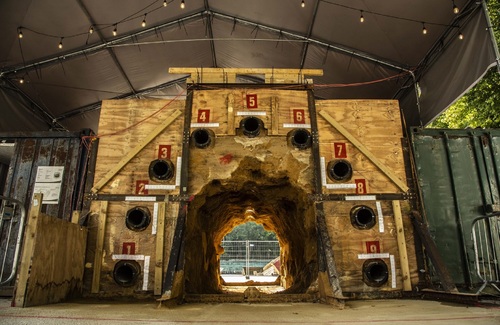hyperTunnel reveals the world’s first underground structure built entirely by robots
British start-up’s ‘Peak XV’ tunnel demonstrates the potential of a radical new construction method to transform urban planning – by building underground infrastructure faster, more affordably and more sustainably than current techniques.
London, October 19th 2022 – hyperTunnel, the British technology company innovating underground construction, has revealed the world’s first entirely robot-constructed underground structure, built at its R&D facility in the North Hampshire Downs.
hyperTunnel’s completely new automated construction method is designed to build tunnels more than 10 times faster and at half the cost of conventional methods. The approach is significantly friendlier to the environment and will use sustainable materials such as low-carbon concrete. Without any human needing to enter the structure during construction, the hyperTunnel method could transform safety in the tunnelling industry.
Using swarm construction methods according to a digital twin of the tunnel, a fleet of ‘hyperBot’ robots enters the ground via an arch of HDPE pipes. Once inside, the robots 3D-print the tunnel shell by deploying construction material directly into the ground. The 6 metre-long, 2 metre-high and 2 metre-wide Peak XV ‘pedestrian-scale’ tunnel has been delivered as part of a project for Network Rail and revealed at the British Tunnelling Society Conference & Exhibition in London (October 11th & 12th).
The Network Rail project has been demonstrating the hyperTunnel process, investigating the technologies that are key to low-disruption tunnel repairs for the UK’s regional railway infrastructure, which includes approximately 650 Victorian age tunnels.
David Castlo, Network Technical Head (Mining and Tunnels) at Network Rail, said: “Our large portfolio of Victorian tunnels requires increasing levels of work to meet the needs of the railway network. However, we want to reduce the level of disruption to our passengers so we are constantly searching for new approaches to enlarging or repairing tunnels that reduce the length of time a tunnel will be closed to trains. Peak XV moves us a step closer to that goal and, crucially, with a method that reduces workforce safety risk.”
Steve Jordan, co-CEO and co-Founder of hyperTunnel, said: “To unveil our first large scale demonstration tunnel is a big step, not only for hyperTunnel, but for the tunnelling and construction industries which are eagerly anticipating the readiness of our approach to use, as appropriate, in their global projects. While using robots exclusively to build underground structures is dramatically different, the contributing technologies, such as digital twins, robotics, 3D printing and digital underground surveying, supported by AI and VR, are all well-proven in other industries. In fact, the hyperTunnel in-situ method is all about de-risking construction projects.”
Earlier this year, hyperTunnel received funding of 1.88 million Euros from the European Innovation Council (EIC) Accelerator scheme, Europe’s flagship innovation programme. The company also received a financial investment from VINCI, a global leader in concessions, energy and construction businesses.
Media contact
For further information on hyperTunnel, please contact Claire Dumbreck, Propel Technology, claire@propel-technology.com / +44 7768 773857.
About hyperTunnel
hyperTunnel is a deep tech scale-up that is developing a revolutionary methodology for tunnels and underground schemes, designed to be substantially faster, safer, more economical and more environmentally friendly than current techniques. hyperTunnel’s goal is to dramatically reduce the cost of tunnels, allowing global demand for increased, yet more sustainable transportation solutions, to be met.
hyperTunnel uses a unique combination of proven technologies from diverse industries – including digital twins, robotics, 3D printing and digital underground surveying, supported by AI and VR – to redefine what is possible in tunnel construction, enlargement, monitoring and repair.
Founded in 2018 by businessmen Steve Jordan and Jeremy Hammond, hyperTunnel employs 40 people located at its Basingstoke (UK) headquarters, and outdoor learning environment (the hOLE) and Geolab in the North Hampshire Downs. hyperTunnel’s patented methodologies and its range of products and technologies, many of which have patents pending, are available via licence, (including exclusive technology distributor rights), leasing, consultancy and project support.
In 2021, hyperTunnel announced a contract with Network Rail. hyperTunnel has received a string of awards from business, innovation and technology experts. It has received funding of 1.88 m Euros from the European Innovation Council (EIC)’s EIC Accelerator scheme. hyperTunnel was recently picked by the UK government’s Innovate UK agency to join its Global Business Innovation Programme. It has also won Startup of the Year at this year’s Construction Technology Awards in Dubai. In 2021, hyperTunnel was highlighted as a Top 50 Contech Startup and was among 10 winners of the global Construction Startup Competition.
www.hyperTunnel.co.uk
https://www.linkedin.com/company/hypertunnel-limited/
hyperTunnel You Tube channel
